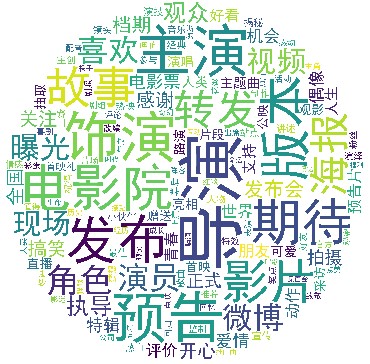 PDF(1535 KB)
PDF(1535 KB)


 PDF(1535 KB)
PDF(1535 KB)
 PDF(1535 KB)
PDF(1535 KB)
影响电影微博互动效果的隐藏主题探究方法及应用
Research Method and Application of Hidden Themes Influencing the Interactive Effect of Movie Microblog
[目的/意义]探究影响电影微博互动效果的隐藏主题能发掘用户关注的热点问题,为企业提供有效的营销策略。 [方法/过程] 从新浪微博上爬取2017年上映的123部电影的热门微博,采用主题建模方法挖掘电影微博文本中的隐藏主题,利用回归方法分析隐藏主题对电影微博互动效果的影响。 [结果/结论] 结果发现6个可解释主题:电影人物、电影宣传、互动营销、电影内容、电影评价和线下活动,其中电影宣传、互动营销、电影内容和电影评价4个主题正向影响电影微博的互动效果;同时发现用户粉丝数和话题讨论热度正向影响电影微博的互动效果。
[Purpose/significance] Exploring the hidden themes that affect the interactive effect of movie microblogging can explore the hot issues of users' attention and provide effective marketing strategies for enterprises. [Method/process] This paper crawled the popular microblog of 123 movies released in 2017 from Sina Weibo, used the topic modeling method to mine the hidden themes in the movie microblog text, and used the regression method to analyze the impact of hidden themes on the interactive effect of movie microblogging.[Results/conclusions] It turns out that there are 6 interpretable themes: movie characters, movie promotion, interactive marketing, movie content, movie evaluation and offline activities, of which 4 themes of movie promotion, interactive marketing, movie content and movie evaluation have a positive impact on the interactive effect of movie Weibo; at the same time, it is found that the number of user fans and the popularity of topic discussion positively affect the interactive effect of movie Weibo.

| [1] |
夏立新,张纯,陈健瑶,等.企业微博内容对网络口碑及品牌认可度的影响[J].情报科学,2019,37(4):79-85.
|
| [2] |
李慧,王丽婷.基于话题标签的微博热点话题演化研究[J].情报科学,2019,37(1):30-36.
|
| [3] |
新浪微博数据中心.2018年度微博电影白皮书[EB/OL].[2019-02-03].https://data.weibo.com/report/reportDetail?id=430.
|
| [4] |
李红,项子晴.企业微博营销效果影响因素分析——以小米公司为例[J].价格月刊,2017(11):78-80.
|
| [5] |
席林娜,窦永香.基于计划行为理论的微博用户转发行为影响因素研究[J].数据分析与知识发现,2019,3(2):13-20.
|
| [6] |
陈姝,窦永香,张青杰.基于理性行为理论的微博用户转发行为影响因素研究[J].情报杂志,2017,36(11):147-152,160.
|
| [7] |
谢正霞. 基于用户交互的企业微博传播效果评价研究[D].广州:华南理工大学,2019.
|
| [8] |
周庆山,赵雪,赵需要,等.我国数字内容产业研究的主题知识图谱分析[J].情报理论与实践,2012,35(4):56-61.
|
| [9] |
陈娟,刘燕平,邓胜利.政务微博辟谣信息传播效果的影响因素研究[J].情报科学,2018,36(1):91-95,117.
|
| [10] |
魏萌,张博.新浪微博“网红”的微博内容特征及传播效果研究[J].情报科学,2018,36(2):88-94.
|
| [11] |
WU S, HOFMAN J M, MASON W A, et al. Who says what to whom on twitter[C]//Proceedings of the 20th international conference on world wide Web. Hyderabad: ACM, 2011: 705-714.
|
| [12] |
CHA M, BENEVENUTO F, HADDADI H, et al. The world of connections and information flow in twitter[J]. IEEE Transactions on Systems, Man, and Cybernetics-Part A: systems and humans, 2012, 42(4): 991-998.
|
| [13] |
ZHANG L, PENG T Q. Breadth, depth, and speed: diffusion of advertising messages on microblogging sites[J]. Internet research, 2015, 25(3): 453-470.
|
| [14] |
SO J, PRESTIN A, LEE L, et al. What do people like to “share” about obesity? a content analysis of frequent retweets about obesity on Twitter[J]. Health communication, 2016, 31(2): 193-206.
|
| [15] |
SOBOLEVA A, BURTON S, MALLIK G, et al. Retweet for a Chance to…’: an analysis of what triggers consumers to engage in seeded eWOM on Twitter[J]. Journal of marketing management, 2017, 33(13/14): 1120-1148.
|
| [16] |
周炜翔,张仰森,张良.面向微博热点事件的话题检测及表述方法研究[J].计算机应用研究,2019,36(12):3565-3569,3578.
|
| [17] |
刘艳秋,方建群,胡静,等.人格因素及家庭环境对生态移民青少年冒险行为的影响[J].中国健康心理学杂志,2019,27(12):1871-1875.
|
| [18] |
王林, 潘陈益, 朱文静, 等. 机构微博传播力影响因素研究[J]. 现代情报, 2018, 38(4): 35-41.
|
| [19] |
张玥, 孙霄凌, 浦正宁,等. 微博舆情传播影响因素研究——基于信源特征和信息形式的视角[J]. 情报资料工作, 2014(3): 59-64.
|
| [20] |
刘彤, 尹仔锋. “可及”环境与“不可及”环境——电影微博营销影响因素探析[J]. 新闻界, 2012(23): 66-70.
|
| [21] |
李莉, 林雨蓝, 姚瑞波. 基于LDA 模型的交互式文本主题挖掘研究——以客服聊天记录为例[J]. 情报科学, 2018, 36(10): 64-70.
|
| [22] |
唐晓波, 王洪艳. 基于潜在语义分析的微博主题挖掘模型研究[J]. 情报学报, 2013, 56(24): 114-119.
|
| [23] |
HENG Y, GAO Z, JIANG Y, et al. Exploring hidden factors behind online food shopping from Amazon reviews: a topic mining approach[J]. Journal of retailing and consumer services, 2018 (42): 161-168.
|
| [24] |
金坚.大数据时代信息熵的价值评价研究[D].长春:吉林大学,2019.
|
| [25] |
WANG Y, AGICHTEIN E, BENZI M.. TM-LDA: efficient online modeling of latent topic transitions in social media[C]// KDD '12: Proceedings of the 18th ACM SIGKDD international conference on knowledge discovery and data mining. New York: Association for Computing Machinery,2012: 123–131.
|
张新香:指导论文构思与写作,提出修改意见并修改终稿;
赵彩霞:负责数据采集、初稿撰写及论文修改。
/
| 〈 |
|
〉 |